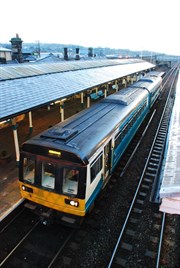 Read the peer review for this feature.
Read the peer review for this feature.
Download the graphs for this feature.
The Invitations To Tender for the Northern and TransPennine Express franchises show that many of the ambitions set out in Greengauge 21’s research published in January 2015 are now due to be met.
It is particularly pleasing to see reference to the development of a zonal fares system included in the ITT, in addition to extra capacity, new rolling stock and strengthened support for community rail.
The overall aim of our report was to define the stepping stones needed between now and the 2020s, when major new rail investment comes on stream in the shape of Northern Hub and electrification - stepping stones that Greengauge 21 argued should form an integral part of the new Northern franchise.
In the past, the Department for Transport took the view that the Northern franchise should be managed on a minimum net cost basis. But rail demand has grown way above expectations, and Northern’s services are among the busiest in the country. The cities Northern serves are also at the core of the North’s economic hopes, which is why the Campaign for Better Transport asked Greengauge 21 to set out the case for improving the Northern franchise.
The central conclusion of our research was that the Invitation To Tender needed to reject the minimum cost approach for Northern Rail always taken in the past. The overarching aim must be to support growth in the wider economy of the North, rather than seek to reduce subsidy levels that would risk defeating the objective of rebalancing the national economy.
To achieve this wider aim, we highlighted and covered a critical set of issues for the North and the franchise:
- Why the Northern franchise matters to both the North’s and the nation’s economy.
- Why devolution matters.
- Why the picture on Northern franchise subsidy is misleading.
- Why appraisal needs to reflect the big picture on economic growth.
- Why the Northern franchise needs to be funded to address growth in demand.
- What can be achieved by modernising the rolling stock used by Northern.
- How a modernised Northern franchise will support the development of an inter-city network for the North.
- Why it is time for a better fares system across the North.
Why the Northern franchise matters
The Northern franchise is of fundamental importance to both the North’s and the nation’s economy.
Almost 25% of the country’s population live in the North, yet the region accounts for less than 20% of the nation’s Gross Value Added. Successive governments have set a priority of addressing this north-south imbalance.
Rail is the mode of transport that is growing most strongly, and it will have a key role to play in improving the economy of the North. The Northern and TransPennine franchises provide commuter services directly into almost every town and city in the North with a population above 50,000. The Northern franchise is significant in scale nationally - it operates the largest number of passenger services in terms of both trains per day and train-kms per day of any operating company in the country. And Northern and TransPennine Express together carry more passengers than the whole of the inter-city network.
The cities of the North are especially integral to the region’s economic contribution. Almost two-thirds of gross value added is created by the five core city regions in the North (Liverpool, Manchester, Sheffield, Leeds and Newcastle). Almost 75% of jobs in the knowledge-intensive sector (the fastest-growing sector in the UK economy) are in cities. And of these, 40% are in city centres that are increasingly the most productive part of the economy - supported by rail transport accessibility and affected by the number of potential workers that businesses can hire.
Why devolution matters
Rail improvements need to be fully integrated into regional and local plans. This point was recognised in strategic terms by Sir David Higgins in his Rebalancing Britain report. And it is as important between now and 2025 as it is between 2025 and 2033 when HS2 will come fully on stream - because of the need to integrate with economic development plans and prepare for HS2.
The formation of Rail North showed that the main local authorities, city regions and Combined Authorities can successfully set aside political and geographic differences and work together, taking responsibility for planning at a northern (not just a city-regional) level. This is a hugely important step, unprecedented in the almost half-century since Barbara Castle first created the PTEs to be champions of local public transport in regional cities.
The advent of Rail North and One North (and now Transport for the North) shows that local partners can successfully set aside their differences and form a broader compact to rise to this challenge and provide a clear set of realistic priorities. This trend should be encouraged - it helps make the essential connection between decisions on rail and strategic highways and other policy areas such as fostering successful economic clusters, housing and land-use planning.
In many European Union states rail provision is already a partnership between regional and national authorities, and the UK is increasingly unusual in retaining such a large proportion of rail responsibility at the centre. The trend of regional partners working under the Rail North umbrella should be encouraged - it is one of the stepping stones to the formation of an entity able to take full responsibility for specification and financing of public transport provision (as Transport for London and Transport Scotland do very successfully in their respective areas).











